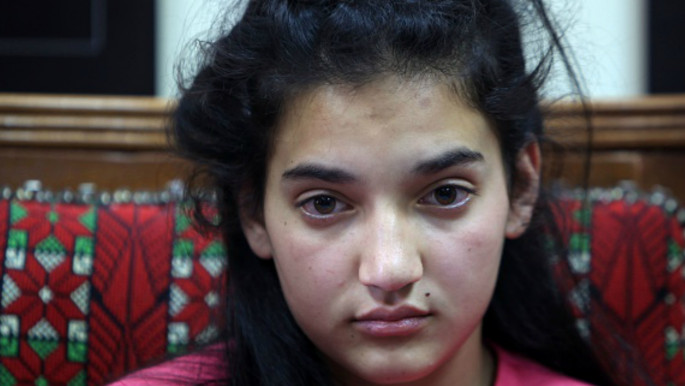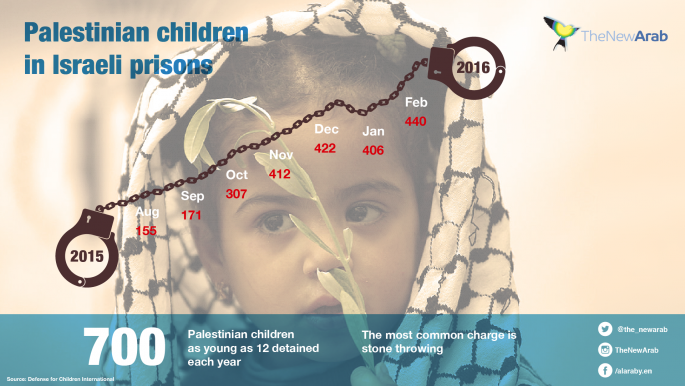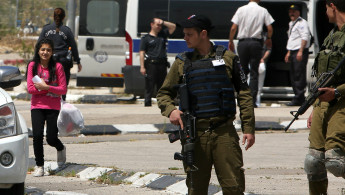Life in Israeli jail: Youngest Palestinian prisoner's harrowing account
Pictures of Dima circulated on social media, as she was handed over to her family. Her face pale and haunted, the signs of psychological and emotional distress were quickly apparent.
Dima was arrested in February, near the entrance of Karmei Tzur, a Jewish settlement built illegally in the West Bank between the Palestinian towns of Beit Ummar and Halhul.
On that day, she says she went out looking for her mother.
"I was sick and no one was in the house, so I went out to look for my mother," Dima tells The New Arab.
"I went out to get her and I found myself outside a settlement. A guard spotted me, shouted at me to freeze and pointed his gun towards me, so I didn't move out of fear that he might shoot me. He started yelling and called the Israeli forces.
"The officers came very quickly. They ordered me to lay on the floor. I was so sacred they were going to shoot me, so I went down on my knees. They apprehended me very quickly, knocked me to the ground and tied my hands tightly behind my back."
Dima was questioned while lying on the floor with her hands tied back in a very painful position, she says.
The forces repeatedly asked her to state her name and the reason for her presence there.
They searched Dima over and over, set police dogs on her and threatened to shoot, she says.
Dima, who was still in shock from her detention experience, takes time to recall the details.
"I arrived at the police car, where a female officer was carrying metal handcuffs. I begged her not to handcuff my hands behind my back as it was very painful. But she did not concede. She handcuffed me, blindfolded my eyes and they took me for interrogation."
 |
Dima was questioned while lying on the floor with her hands tied back in a very painful position |  |
 |
|
| Dima's face was pale and haunted with signs of psychological and emotional distress [AFP] |
An abusive interrogation
Dima was shaken by the interrogation process, where she was verbally abused and threatened.
"The investigator was shouting and pounding on the table. I felt intimidated and scared. I did not even understand his questions," Dima says.
"He was asking me whether I belonged with Fatah or Hamas. I did not understand why he would ask me that. I was intimated, I just kept saying whatever came to my mind because I was so scared."
Dima stayed under interrogation until the early hours of the morning as officers, seeking a confession, continued to threaten her.
"You will be convicted Dima, and it will be a life imprisonment. You will remain in prison for the rest of your life. You will never go out and you will not see your family again," the officers told her.
 |
You will be convicted Dima, and it will be a life imprisonment. You will remain in prison for the rest of your life. You will never go out and you will not see your family again |  |
Hours later, an investigator came in and herald a series of allegations to which she would be charged.
"He said I intended to kill someone. He repeated that over and over, as if he wanted me to say that I went there to kill someone so that they can charge me."
Under a plea bargain with Israeli military prosecutors, Dima pleaded guilty to the charges and was sentenced to four months imprisonment.
| Read also: 'No way to treat a child': The New Arab's exclusive on Palestine's imprisoned children |
Behind bars
Dima was sentenced to four and a half months imprisonment.
She spent two and a half months in prison before she was released following considerable pressure from human right organisations.
During her detention, she was held in an Israeli military prison, where most Palestinian prisoners are detained.
That is where Dima became the youngest Palestinian girl in Israeli prison.
 |
I saw that most of the Palestinian prisoners who were detained after the uprising in October had actually been shot during their arrest |  |
Other Palestinian prisoners acted as guardians to her during her detention. They tried to help ease the harsh conditions of imprisonment.
"I met there Khalida Jarrar, who is currently the eldest Palestinian prisoner," Dima says.
"I saw that most of the Palestinian prisoners there, who were detained after the uprising in October, had actually been shot during their arrest."
"Most of these women have done nothing. It is terrible that they have been imprisoned. Some of them are in desperate conditions."
Dima says she had trouble sleeping at night.
"One night, I rolled over and fell on the floor. I hit my head and it was bleeding. I was unconscious. I remember waking up to the wailing of the other prisoners."
Dima says the medical attention she needed that night never came.
Psychological and emotional distress
"I am thankfully out of prison now," Dima says, as she smiles.
Soon she will return to school and see her friends.
"My dream is that when I grow up I can be a lawyer who can defend children who have been oppressed," she says.
But Dima faces a long-term risk of psychological and emotional distress following the experience she endured in Israeli detention.
 |
My dream is that when I grow up I can be a lawyer who can defend children who have been oppressed |  |
Every year, around 700 Palestinian children face arrest and prosecution at the hands of the Israeli military.
Israel currently holds about 440 Palestinian minors in military prisons, with 100 of them under the age of 16.
 |
|


![President Pezeshkian has denounced Israel's attacks on Lebanon [Getty]](/sites/default/files/styles/image_684x385/public/2173482924.jpeg?h=a5f2f23a&itok=q3evVtko)



 Follow the Middle East's top stories in English at The New Arab on Google News
Follow the Middle East's top stories in English at The New Arab on Google News


